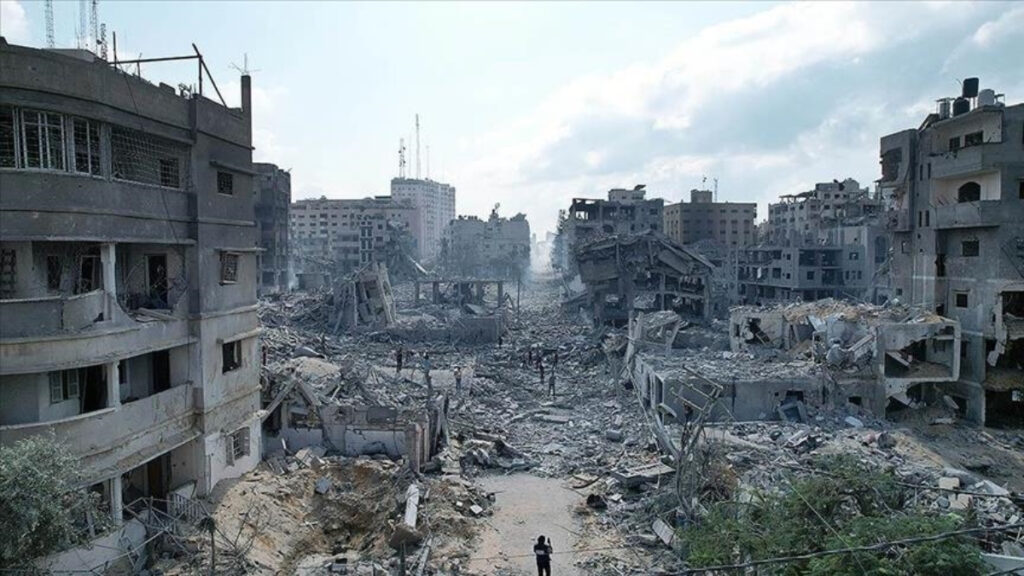Israeli Prime Minister Benjamin Netanyahu presented to the mini-security cabinet a document of principles related to the post-war policy in Gaza, as reported by the Israeli broadcasting authority.
This marks the first time Netanyahu has presented his plan for managing Gaza after the war, as he had avoided presenting any vision in the past months during the war to prevent divisions in his coalition. Axios, the American news site, reported that Netanyahu’s plan lacks concrete details and relies largely on his previous statements regarding the war in Gaza.
Details of Netanyahu’s plan
The document stipulates that the Israeli army will continue its war in Gaza until its objectives are achieved. It also revealed Tel Aviv’s intention to “establish a security zone within the Gaza Strip, in the area adjacent to Israeli towns,” adding that it “will remain present as needed.”
Regarding the southern area of the Gaza Strip, Netanyahu plans to maintain what he described as “southern closure” on the border between Gaza and Egypt “to prevent the rearming of factions in the Gaza Strip,” according to his claim.
As for UNRWA, the Israeli authority indicated that Netanyahu’s document also includes a clause to close down the UN agency and replace it with other international relief agencies.
The document also addressed the issue of rebuilding the Gaza Strip, stating that Netanyahu’s government will not allow reconstruction until all weapons in the sector are completely removed (except for weapons necessary to maintain public order), and after starting the process of “eradicating extremism in the sector,” a position Netanyahu had not previously expressed.
Axios reported that the Israeli document calls for disarming Gaza completely to end any military capability in exchange for agreeing to rebuild the sector.
Regarding education in the Gaza Strip, Netanyahu’s document called for “a comprehensive plan” to combat extremism in all religious, educational, and social institutions in the Gaza Strip, with the participation of Arab countries experienced in promoting counter-extremism efforts in their territories.
Israel opposes the establishment of a Palestinian state
The document, which included Netanyahu’s plan after the war in Gaza, also confirmed that “Israel will continue to oppose recognizing the Palestinian state unilaterally,” considering that “such recognition after the events of October 7th would prevent any peaceful settlement in the future,” and that it rejects “international dictates regarding a permanent settlement with the Palestinians.”

It also added that “such an arrangement will only be reached through direct negotiations between the two parties, without any preconditions.”
The document did not specify Netanyahu‘s vision for managing the sector after the war but indicated that “local elements with administrative experience” would be responsible for civil administration and public order in Gaza.
Israeli delegation for negotiations
This comes at a time when the War Council confirmed its sending of the negotiating delegation to Paris to hold talks related to the release of prisoners and the cessation of hostilities in Gaza, according to the official broadcasting authority.
The broadcasting authority noted that the delegation would be headed by the head of Mossad, David Barnea.
The Hebrew website “Walla” quoted a government source described as “informed” (without naming him) as saying that the delegation would include, along with Barnea, the head of the Shin Bet, Ronen Bar, and Major General Nissan Alon, the coordinator of the prisoners and missing persons committee.
The source added that the talks would also involve the director of the Central Intelligence Agency (CIA), William Burns, and the Qatari Prime Minister, Mohammed bin Abdul Rahman Al Thani, and the head of the Egyptian Intelligence Service, Abbas Kamel.
The “Walla” website reported that the War Council decided to send the delegation under intense American pressure, as well as internal pressure from members of the War Council: Defense Minister Ya’alon, Benny Gantz, and Gadi Eisenkot, who believe it is necessary to send a negotiation team to participate in the talks and give it a mandate to conduct serious negotiations.
Since October 7, 2023, the occupation has waged a destructive war on the Gaza Strip, leaving tens of thousands of casualties, most of them children and women, according to Palestinian and international data, leading Israel to appear before the International Court of Justice on charges of committing “genocide”.
Sunna Files Free Newsletter - اشترك في جريدتنا المجانية
Stay updated with our latest reports, news, designs, and more by subscribing to our newsletter! Delivered straight to your inbox twice a month, our newsletter keeps you in the loop with the most important updates from our website












